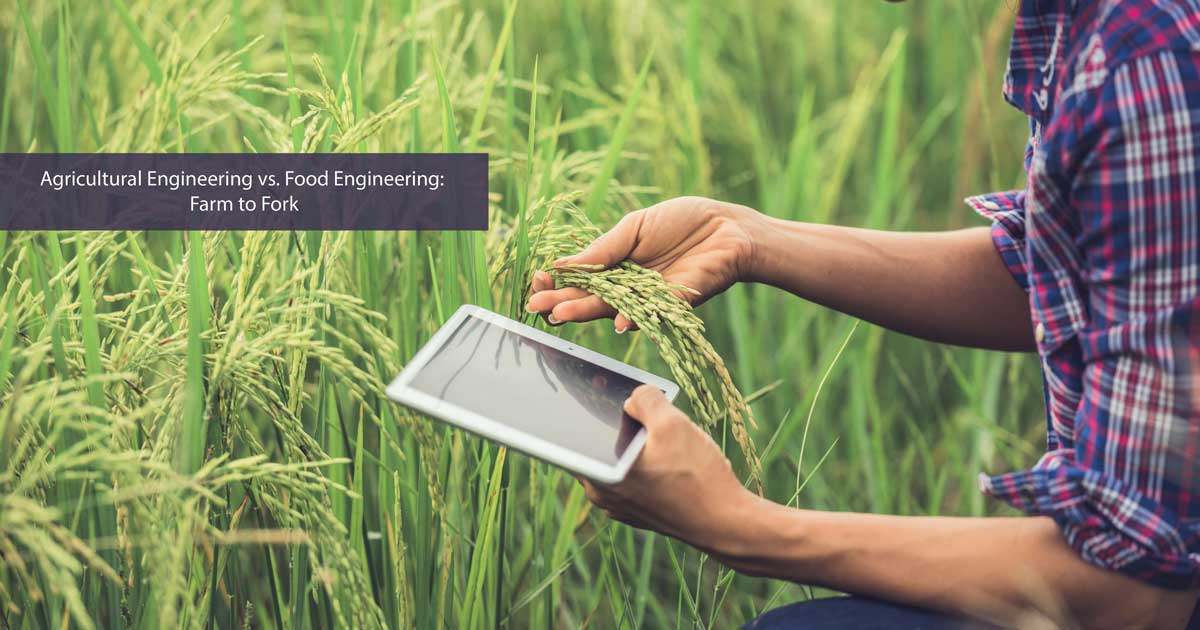FET Blogs


FET Blogs



13 May 2024
Table of Contents:
In the field of applied sciences, technology and engineering Agricultural Engineering and Food Engineering are two distinct yet interrelated fields crucial in ensuring an efficient food production system. Both aim to serve the food industry and help improve overall efficiency and sustainability.
Agricultural engineering combines agricultural practices with engineering principles that optimise and enhance the agricultural system. It deals with designing, developing and improving various agricultural improvements, processes, and machines used in farming. Professionals in this field work on enhancing crop cultivation techniques, irrigation systems, and farm machinery, aiming to optimise productivity while minimising environmental impact. On the other hand, food engineering deals with the post-harvest aspects of the food production chain. It involves the application of engineering principles to the processing, preservation, and packaging of food products. Food engineers work to develop innovative methods for food processing, ensuring the safety, quality, and nutritional value of the final products.
The agricultural engineering bachelor’s course spans four years and covers various aspects of engineering, including basics, concepts of crops and soil, and practical knowledge of the course. Students also delve into core engineering principles, agricultural sciences, and specialised courses in farm machinery, irrigation systems, and crop management.
A bachelor’s degree in food engineering also takes four years to complete and provides knowledge about food engineering, food science, food packaging, and food manufacturing. The four-year-round course is valuable and worthwhile for students interested in food science, food chemistry, food processing technologies, quality control, and understanding the food industries.
Agricultural engineering interfaces with agronomy, environmental science, and mechanical engineering. To be responsible for developing and designing new and innovative farm equipment or machinery and to enhance productivity in the agriculture field, one needs knowledge in agricultural engineering domains. Some of the courses in this field are:
Food engineering integrates aspects of chemical engineering, microbiology, and nutrition. Students who wish to pursue food engineering should have scientific knowledge, project management, problem-solving, and communication skills. To cover all of these and more, coursework in food engineering includes:
Agricultural engineering offers diverse and rewarding career opportunities, contributing significantly to different agricultural and food production stages. An agricultural engineer can work in the private and public sectors depending on one's interest. Specifically, in an agrarian economy like India, they are in high demand and play an essential role in economic development. Some of the job profiles that are suited for this course are:
Agronomists study the different practices and have knowledge of crop production principles and soil management for optimising crop yields and soil fertility.
Microbiologists research beneficial and harmful microorganisms in the soil or plants to improve soil health and decrease plant diseases. They work on improving agricultural sustainability via microbiological interventions.
Research analysts conduct experiments to analyse data that assist in developing innovative solutions for agricultural problems and evaluate the efficiency of agricultural methods and practices.
Agricultural inspectors are responsible for ensuring compliance with the standards and regulatory practices related to agriculture, food safety and the environment.
Crop engineers design and develop irrigation systems that improve crop yield and cultivation, along with focusing on engineering principles that increase crop production.
In contrast, a degree in food engineering can open doors to various job profiles. Being a versatile course, it can help those interested in food processing, packaging and distribution or safety and prevention. Professionals in this field are key in enhancing efficiency, sustainability, and safety within the agricultural and food sectors. Some of the career opportunities that one can get with this degree are:
Food engineers oversee and store agriculture-related material in the process of food manufacturing.
Food storage managers take care of the employees, goods storage facility and other day-to-day activities in the food storage business.
Quality assurance specialists help improve food safety and quality by conducting regular inspections and taking care of safety protocols about food processing plants.
The country's ever-growing population is directly proportional to the increase in demand for food. Therefore, the roles of a food engineer and an agriculture engineer are paramount now. They work towards improving crop yield for maximising agriculture output, ensuring food security, promoting sustainability, and addressing the domestic demand for sustainable and secure food systems. These very interesting fields combine engineering and science with technology to better utilise food resources.
A1: Top agriculture and food engineering packages can reach 10-15 lakhs per annum.
A2: BTech food engineering graduates earn 4-8 lakhs per annum in India.
A3: Yes, food processing engineering is a growing career in food industries.
A4: Food engineering has strong scope in food safety and processing innovation.
Popular Post
17 February 2026
AIE Full Form
10 February 2026
AEIE Full Form
22 January 2026
AE Full Form
16 January 2026
What is Aerospace Engineering?
16 January 2026
What is Chemical Engineering?
Ask an Expert for Free